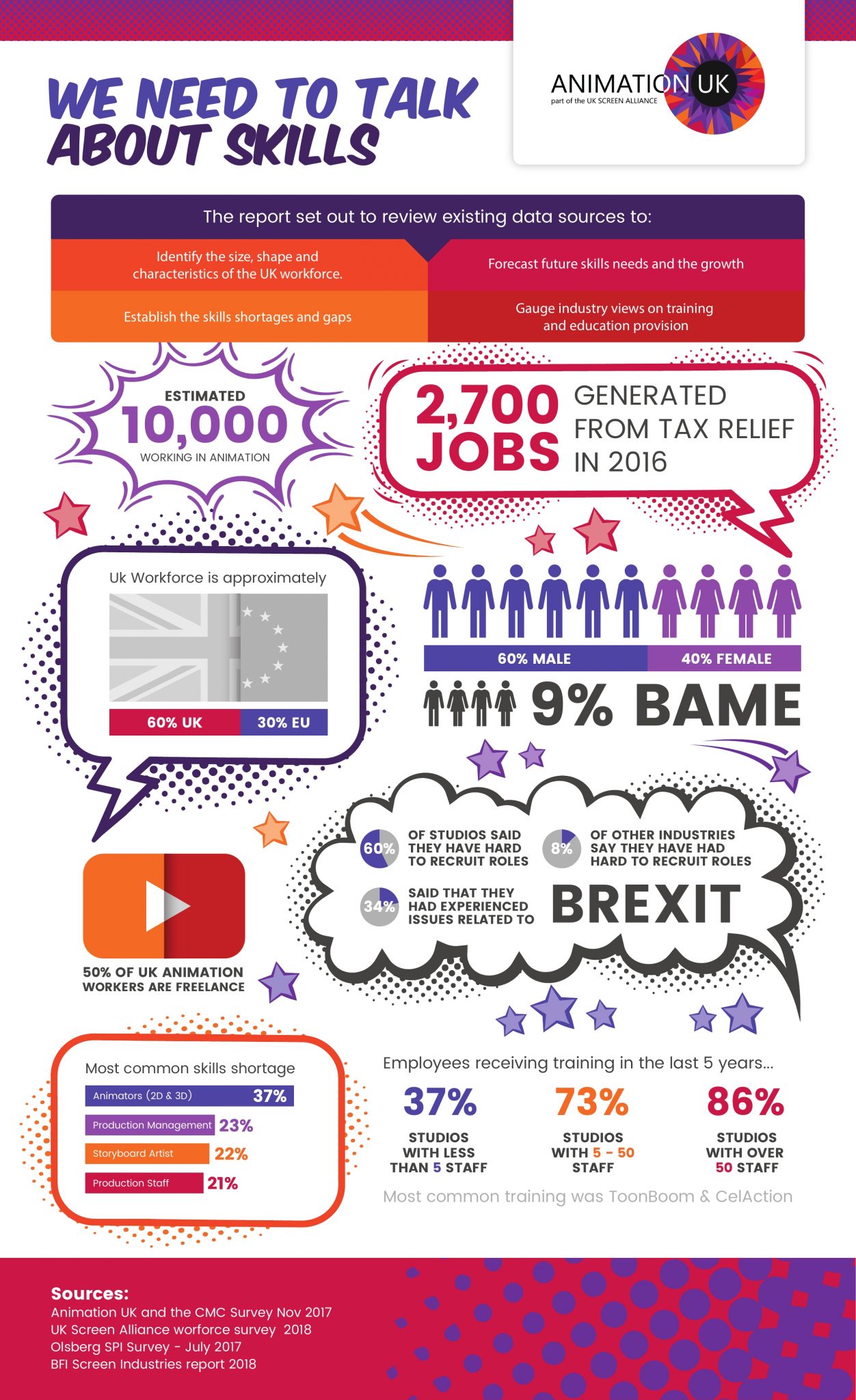Animation UK want to develop a real partnership between the industry and education providers to ensure that our young skilled talent directly feeds into and supports the Animation sector in the UK.
Animation UK has published an Animation UK Manifesto, which outlines five proposals that offer a strategic and linked approach to fuel the growth of the UK animation industry. By focusing on competitive tax incentives, reversing PSB investment cuts, leveraging commercial opportunities and investment in IP linked to downstream revenue and investing in education and skills, we aim to not only safeguard the future of the UK animation sector, but also, to position it as a global leader in innovation and creativity. In each case, the recommendations minimise any direct contribution from the Government, and we have indicated a return on investment or an investment return on the intervention. Together, they will create a climate for growth.
The current state of creative education is concerning, with it being increasingly devalued and underfunded in the public education system. Much like other creative sectors, the animation industry faces significant skills gaps and shortages at various levels. Notably, animation skills are crucial and transferable across digital production and across the broader creative economy.
To address the skills crisis, we propose a new partnership investment plan. This plan aims to bridge skills gaps and shortages at all levels, ultimately positioning the UK as a global leader in digital production. Strategic investment in the future facing skills and talent is imperative. Investments should involve collaboration between national and local governments and industry partners. We suggest a new approach to link employer skills contributions to tax relief and production-based training to boost employer investment in this plan.
In December 2023, Olsberg SPI was commissioned by the BFI to publish the “Skills Scoping Study for the UK’s
Digital Content Production Sectors“. The report identified key skills gaps and shortages that translate into real opportunities for job creation UK-wide across the UK’s growing digital content production sectors. Read more details in the press release here.
This report underscores the skills gaps and shortages, the cross-sector mobility, and the competition from overseas for our skilled workforce and talent. Developing strategies to nurture and retain our skilled workforce is imperative, particularly as animation not only generates widespread employment across the UK but also bolsters high-quality jobs. With a workforce of over 16,000 based across the UK in hubs in every region and nation, animation craft, technical and creative skills are central to all digital production.
The consequences of inaction are significant. The digital production sector overall, acting as the R&D hub for the screen industries and the broader virtual and immersive content, plays a key role. By positioning the UK as a global epicentre for cutting-edge computer-generated content and technologies, we can also extend our expertise to diverse fields such as industrial design, medicine, retail, education, and the evolution of the digital landscape. This report is a catalyst for developing strategies that support growth and will be thoroughly reviewed by the Industry Skills Task Force in the ensuing months.
Kate O’Connor, Executive Chair of Animation UK
In early 2024, Animation UK and UK Screen Alliance launched their new Education membership. This branch was formed with the aim of improving the connection between educators and industry to address ongoing skills issues.
Previous work
In 2018, Animation UK carried out vital research highlighting skills gaps, and workforce shortages within UK Animation, and published the report “We need to talk about skills”. Funded by the Animation Skills levy, this report collected all current data on skills and employment in the sector. It drew on national data sources, up-to date employer surveys conducted by the UK Screen Alliance and a wide-reaching survey carried out by Animation UK. It collected known data on the workforce, highlighted range of skills gaps and shortages, and illustrated that Animation is continually under-served by national data sources.
Animation UK worked with the newly established Animation Skills Council set up by ScreenSkills and chaired by Tom Box, the NextGen Skills Academy, Higher Education and a range of other partners to find solutions.
It is vital that we develop a real partnership between the industry and education providers to ensure that our young skilled talent directly feeds into and supports the Animation sector in the UK. We have a significant challenge ahead, with a need for careers information and mentors through to developing higher level creative skills and talent and Animation UK will focus its effort on supporting the essential partnership and dialogue between the industry and education.
Kate O’Connor, Executive Chair of Animation UK










